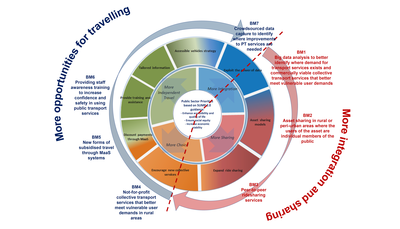
In early 2020, the INCLUSION project developed an initial set of 14 Business Models (BMs) based on those concepts that provide the link between policy priorities and inclusivity goals. These Business Models were assessed according to different criteria, such as prioritised areas for implementation, synergies with the INCLUSION demonstration Pilot Labs, links with the 50+ case studies collected, feasibility of implementation in a short time period, and more. This resulted in the selection of 7 Business Models where the INCLUSION project highlighted concrete/specific opportunities to improve inclusive mobility for different groups/circumstances.
The seven BMs selected have been validated in Summer 2020 through: i) Surveys involving the INCLUSION Stakeholder Forum and Pilot Labs, designed to elicit opinions on the viability of the BM developed (thinking about effectiveness, efficiency, affordability, and practicality), to solve the identified mobility challenges; and ii) An on-line workshop (held 15th July 2020) with the Stakeholder Forum to consolidate the survey’s results and to conduct a second-level analysis of the 7 BMs.
The most promising BMs, in relation to each type of stakeholder primarily involved (i.e. Private sector led, Public sector led, Public-Private partnership, Community sector led, and Solutions to support multi-actor delivery), were analysed in-depth. In particular, for each of the validated BMs, a set of recommendations on transferability and long-term sustainability has been developed and collected in a specific Deliverable (D6.2 – “Recommendations on the transferability of the proposed business models”), that will be published in October 2020. The Deliverable includes a specific section where the main recommendations for inclusive mobility are presented, which uses findings from the business model development activities and other tasks of the project.